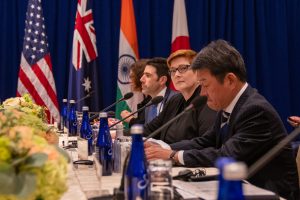In a special briefing on U.S. Secretary of State Mike Pompeo’s Tokyo visit, senior State Department officials have offered additional, useful, details about the Trump administration’s vision for the Indo-Pacific as well as the four-nation Quad. Speaking onboard Pompeo’s aircraft en route the U.S. on October 6, one official noted “there’s no avoiding the fact that it’s China and its actions in the region that make the Quad actually matter and function this time around.”
The four-nation grouping — encompassing Australia, India, Japan, and the U.S. — was revived on the sidelines of the ASEAN Summit in Manila in November 2017, a decade after it was first proposed. The first edition of the Quad foreign minister’s meeting was held last September in New York amid growing dialogue and coordination between Australian, Indian, Japanese, and U.S. officials. This year’s edition, hosted by Japan’s new Suga administration in Tokyo, touched on familiar themes with post-pandemic recovery understandably featuring at the top of the agenda. The meeting readouts, however, reveal subtle differences in areas of emphasis for all four countries.
In an interview to Nikkei Asian Review while he was Tokyo, Pompeo brought up the need for institutionalization of the Quad, which has so far performed as an expanding set of informal consultations around regional issues, often also involving other Indo-Pacific powers. While he was careful not to emphasize the hard-security dimension of a formalized Quad, Pompeo’s remarks add heft to comments by his deputy, Stephen Biegun. In August, Biegun had noted that given the absence of “strong multilateral structures” that are also inclusive in the Indo-Pacific, “there is certainly an invitation there at some point to formalize a structure like this.”
When asked about Pompeo’s remarks, senior officials explained that the administration’s emphasis lies on “effective multilateralism” and the United States’ Quad push must be understood in that context, in sync with the U.S. efforts to increase coordination among the Five Eyes countries, for example. But their emphasis on “result-oriented multilateralism” hints at growing American frustration with the Association of Southeast Asian Nations (ASEAN), even though the Quad liturgically continues to emphasize ASEAN centrality in its statements. Last month, Pompeo had asked ASEAN nations to not “just speak up but act” against Chinese firms operating in their countries. On its part, ASEAN refuses to pick sides in the intensified U.S.-China strategic rivalry.
What was exceedingly interesting about yesterday’s briefing was how India repeatedly came up in it. Asked whether the U.S. was concerned that other Quad members were not “forward-leaning on countering” China, one official explicitly brought up the ongoing India-China military standoff in Ladakh, noting that it fit the pattern of Chinese “gross aggression” along its maritime and land peripheries. This has also been Pompeo’s public position on the crisis in the past. While refusing to speak on behalf of India, the official did agree that part of India’s shift toward a more proactive stance when it came to the Quad emanated from the ongoing Ladakh crisis.
The officials also expanded on Pompeo’s comment that the incipient Indo-Pacific security architecture must incorporate economic concerns and not just focus on hard military issues. While this is undoubtedly true, Pompeo’s formulation also helps soft sell a future formalized Quad to the region, including ASEAN.
One of the officials noted there was a “lot of agreement around that table” among the four foreign ministers that the core Indo-Pacific challenge is one involving the “free world versus Chinese authoritarianism,” rather than a dyadic U.S.-China tussle. Judging by New Delhi’s careful, and often coy, public stance when it comes to China – irrespective of what it may or may not say privately – it is highly unlikely India will endorse this Manichean view any time soon.

































